How to Play Poker
Poker is a popular card game that’s easy to learn yet difficult to master. Whether you’re new to the game of poker or want to learn more, our extensive poker playing guide includes all the best poker tips and strategies for beginner, intermediate and advanced players to help you become a successful poker player.
How to Play Poker: The Basics
Poker is a game played with a normal deck of 52 cards, whereby players wager bets against each other and rely on their hand, poker strategy, and luck to win the pot. The most common and popular version of poker is Texas Hold’em, whereby your poker hand is formed after you’re dealt two hole cards and five community cards (three on the flop, one on the turn and one on the river), which you must combine to form a five-card hand with the most equity.
There are two ways to win at poker;
- You bluff and force your opponents to also fold their hands, or
- You have the best value five-card hand at showdown
A showdown is when no clear winner has emerged from the rounds of betting, so all players reveal their cards to determine the most valuable hand.
Basic Poker Rules
When playing poker, there are some basic rules that you need to know in order to establish your basic poker strategy. For more information on how to get started playing online poker and on what makes a strong strategy, visit our poker school.
The basic rules of poker are:
Poker Hand Rankings
In poker the highest-value hand determines the winner, so it’s important to understand poker hand rankings so that you know whether to bluff, call, fold or raise.
The poker hand with the most equity is a Royal Flush, which consists of A, K, Q, J, and 10 all in the same suit, while the least valuable poker hand is a High Card, which is when the highest card plays in lieu of any other hands.
Table Positions
Table positions determine the order of the game. All action centers around the button, or dealer, as well as the small and big blinds which are situated to the left of the button.
These positions act first after the flop and influence what other players do each round.
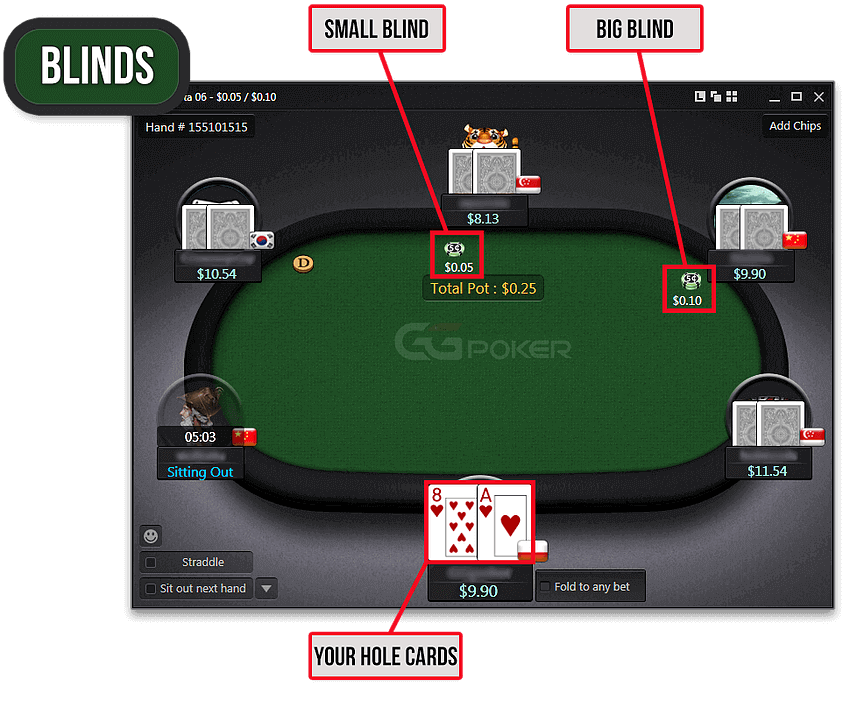
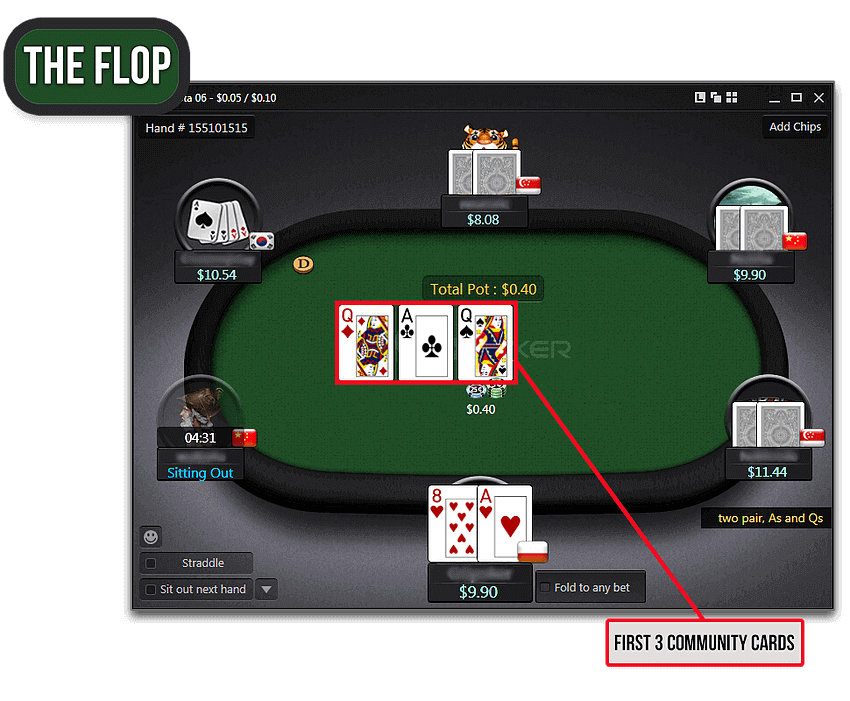
Pre-Flop and Post-Flop actions
The pre-flop begins with the player sitting to the left of the big blind, and then continues clockwise with the big blind acting last. Players must decide between three actions:
- Folding
- Calling
- Raising
The flop refers to dealing and revealing the first three of five community cards. The game then progresses to the post-flop, whereby players have the chance to check, bet, call, fold or raise based on how the three community cards have impacted their hand.
Post-Turn actions
The fourth community card – the turn – is dealt after the flop, and is followed by another round of betting.
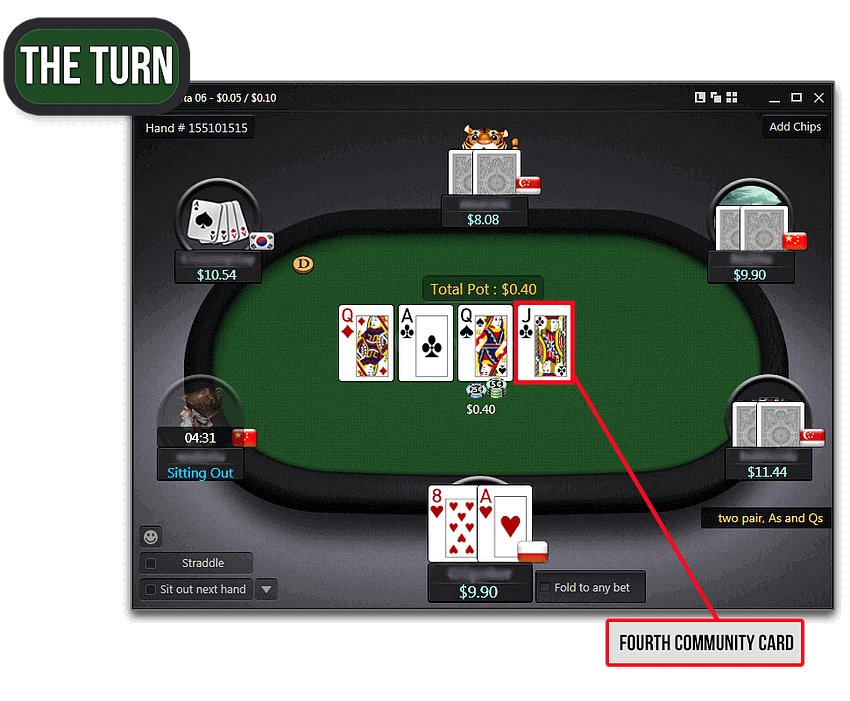
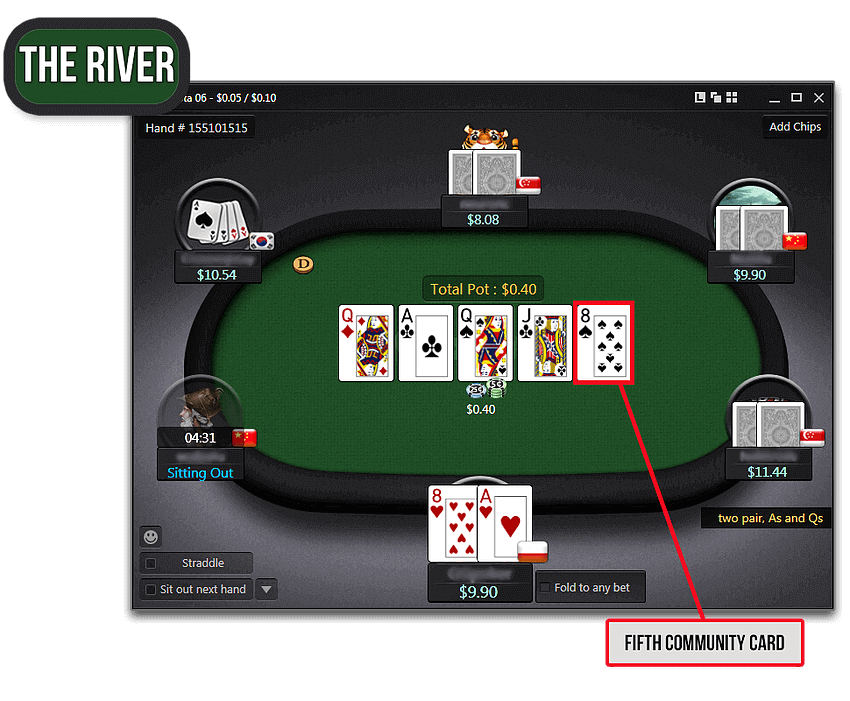
Post-River actions
Next comes the river, whereby the fifth community card is revealed and players will know what their final most-valuable hand looks like.
If no obvious winner is determined post-river, the game moves to a showdown.
The Showdown
The showdown happens when there are at least two players left in the game, who must then reveal their cards to win the hand.
The winner is the player with the most valuable five-card hand who then takes the pot.
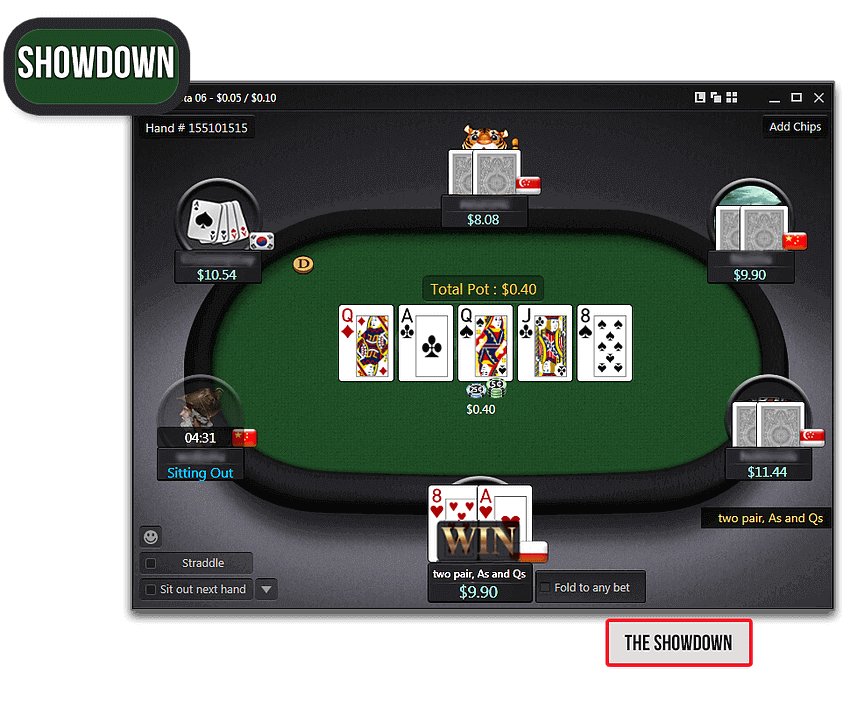
Basic Poker Strategy
Poker is popular because it combines strategy, psychology and luck – but before you start playing, you have to learn basic poker strategy in order to maximize your chance of success. First, you should memorize poker hand rankings, as most beginner mistakes are made when a player thinks they have the winning hand and they don’t. Read our poker hand rankings guide to learn more.
You also need to learn poker terms so you know exactly what’s happening each round. After cards are dealt, players have the option to call (match the sum of the raise), fold (give up and relinquish all chips already in the pot) or raise (put more chips into the pot). Without knowing the correct terminology, you may find yourself making the wrong move by mistake. Check out our poker terms page for more information.
It’s also important to familiarize yourself with the format of poker, so you know how the game will proceed. Generally, a game of Texas Hold’em begins when the button has dealt two cards to every player, starting with the small blind. The small blind is the first to act and may decide whether to bet, or check (essentially pass), followed by a round of betting.
Then three community cards are dealt in the flop, whereby another round of betting proceeds. Then two other cards are revealed in the turn and the river. Then comes the final round, or the showdown, where the winner is revealed. Take a look at our guide to playing Texas Hold’em for more details on how the game is played.
Beginner Poker Tips
Poker may seem difficult to get to grips with, but once you’ve followed basic tips you’re in a strong position to start refining and advancing your strategy. Our poker tips for beginners are:
1. Don’t play every hand
A common mistake made by beginners is to play every hand, without taking into account the probability of success and the hands your opponents may be holding. The more hands you play the higher the odds of losing. Establishing what hands to play and which to fold early is key to success.
2. Check what cards are on the table
Make sure you never lose focus on what cards have been dealt, as they are crucial to determining how successful your hand is likely to be. Have you hit your flush, or is there an open-ended straight? Do you know what cards you need to form the most valuable card?
3. Don’t bluff too much
Another common misconception in poker is that you need to bluff to win. However, it’s better to play your cards well rather than trying to bluff your opponents out of hands, as you may not yet know what your tells are and real bluffing success comes from knowledge and practice.
4. Think about your position
Table position is a really important factor in poker, especially Texas Hold’em. The best positions for beginners are being last to act on the hand, as that means you have more time to analyze your poker hand before having to act.
5. Play for the long term
As a beginner, you’re going to lose some – if not most – of the time. Although the odds won’t always fall in your favor, you should always try to learn from both wins and losses to strengthen your strategy in the long term.
Intermediate Poker Tips
Once you master the beginner strategies of poker, you can move onto an intermediate level. The tips you’ll need to play as an intermediate are:
1. Know the Odds
To take your poker game to the next level, you need to have a good understanding of the odds for various hands that you may have. Once you learn the odds, you better know whether to call, fold, raise or check your hand each round, and are therefore more likely to succeed.
2. Bluff
While you should avoid bluffing too much as a beginner, learning to bluff is essential to becoming a great poker player. Bluffing means tricking players into thinking you have a better hand than you dog. However, you should only bluff when you’ve just won through good play or there’s not many players in the pot.
3. Raising
As an intermediate player, you may want to consider raising more often as you grow in confidence. It’s a good idea to raise if you think you have the best hand at the table, or when you want to drive other players away.
4. Take more risks
Once you become more experienced, you can afford to start playing more questionable hands such as low pairs, if there’s enough money in the pot to justify the risk. Sometimes it also makes sense to play questionable hands in order to confuse your opponents.
5. Read betting patterns
A key to taking your strategy to the next level is being able to identify other players’ betting patterns, through which you can establish which players are the weakest. Learn to read your opponent’s poker faces (online and off!) and identify their tells to inform your decisions.
Advanced Poker Tips
Once you feel you’ve mastered the game past intermediate level, you can take your strategy even higher with advanced poker strategies. Some poker tips for advanced players are:
1. Use math
Mathematical theory is key to vastly improving your game. While you may have relied on online calculators or cheat sheets as a beginner, now is the time to memorize which hands have a better advantage over others, and what your odds are of success.
2. Advanced bluffs
Once you learn how to best read the atmosphere of the table and who you’re playing against, get ready to pull advanced bluffs. Too many players start bluffing before or after the flop and then lose their nerve. You should always pursue your bluff if you know there’s enough equity in your hand.
3. Perfect your poker face
Your poker strategy will go to the next level once you learn to become unreadable. When watching your opponents you can pick up subtle tics and tells, which you can then identify and eliminate in your own playing style.
4. Advanced raises
The raise is the most effective tactic in poker when it comes to intimidating other players. Once your poker strategy is ready to advance, you should consider re-raising, which is the most intimidating move you can make as it usually involves a lot of money.
5. Watch the pros
The best thing about poker is that you never stop learning how to refine and advance your strategy, and one of the best ways to evolve is to watch professional players while competing online. Remember to check out members of Team GGPoker.ca on GGPoker.ca.TV!
What are the Blinds?
Before any cards are dealt in poker, players must pay attention to who is deemed the ‘button’, or the dealer. The purpose of the button is to determine where the action starts each round, which should be with the player to the left of the button who is called the ‘small blind’. Then comes the ‘big blind’, which is the player situated to the left of the small blind. The blinds refer to forced bets posted by players and are utilized in games that are frequently played without antes, in order to allow a player to fold their hand without placing a bet.
How to Play Online with GGPoker.ca
At GGPoker.ca, there is a range of real money poker games and tournaments in a variety of formats to suit your skill level and preferences. To start playing online, download the GGPoker.ca app and sign-up for free to access the thrilling world of online poker.
Types of Poker
To learn exactly which type of poker best suits your preferences, you need to know how many poker game variations are available to choose from. The most common different types of poker are:
Texas Hold'em
This is the most popular poker game that has become the format of choice for most televised tournaments.
Omaha
Omaha poker is similar to Texas Hold’em in form, aside from that players are dealt four hole cards as opposed to two. Visit our Omaha poker guide to learn more.
7 Card Stud
Unlike Texas Hold’em and Omaha, 7 Card Stud is played with a limit betting structure, meaning bets are in fixed increments round-on-round.
There are other poker game variants depending on factors like limited bets, incremental bet increases or the number of community cards revealed, including 7 Card Stud Hi/Lo, Pot-limit Omaha, and Limit Hold’em. At GGPoker.ca, all Texas Hold’em games are ‘no limit’, meaning that there is no limit to the maximum amount a player can bet at once.
Other Articles for Beginners
Once you’ve established a basic poker strategy and familiarized yourself with poker rules and terms, there is still a lot more you can learn in order to advance your strategy.
Some other useful articles you may find useful are an overview of poker terms, our strategy tips for every level of player, and an explanation of the poker hand probability.







